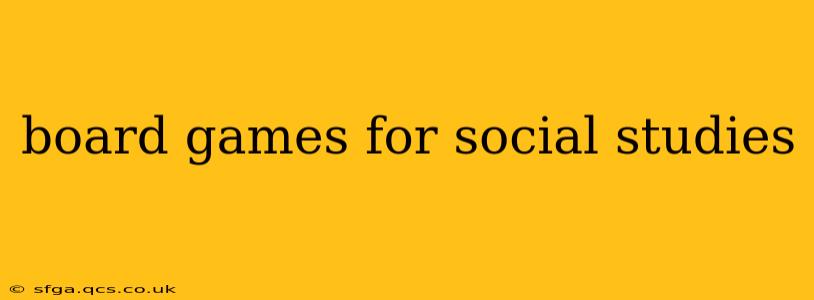Social studies, encompassing history, geography, civics, and economics, can sometimes feel like a dry subject. But what if learning could be an adventure? Board games offer a fantastic way to make social studies engaging and fun for students of all ages, transforming abstract concepts into interactive experiences. This guide explores some of the best board games for teaching and reinforcing social studies concepts, catering to various age groups and learning styles.
What Makes a Good Social Studies Board Game?
Before diving into specific recommendations, let's define what constitutes a great social studies board game. Ideally, a strong game should:
- Accurately represent historical events or geographical locations: The game shouldn't contain historical inaccuracies or misleading geographical information.
- Promote critical thinking and strategic decision-making: Players should be challenged to think strategically, analyze situations, and make informed choices.
- Encourage collaboration and communication (where appropriate): Some games benefit from cooperative gameplay, fostering teamwork and communication skills.
- Be engaging and fun: The game should be enjoyable to play, keeping players motivated and eager to learn.
- Align with relevant curriculum standards: The game should cover concepts relevant to the social studies curriculum for the appropriate age group.
Top Board Games for Social Studies by Age Group and Topic
Elementary School (Grades K-5)
- Ticket to Ride: First Journey: A simplified version of the popular Ticket to Ride, this game introduces young players to geography and route planning. It's perfect for learning about different US states and building spatial reasoning skills.
- Kingdomino: While not explicitly a social studies game, Kingdomino helps develop spatial reasoning and strategic planning, skills essential for understanding geography and historical timelines. The domino-like tiles encourage pattern recognition and creative problem-solving.
Middle School (Grades 6-8)
- 7 Wonders: This civilization-building game introduces players to the concepts of resource management, technological advancement, and cultural development across different historical eras. It's a great way to explore the complexities of societal growth and interaction.
- The Settlers of Catan: This classic game teaches players about resource allocation, negotiation, and trading—essential economic concepts. Players compete to build settlements and develop their economies, fostering strategic thinking and economic awareness.
High School (Grades 9-12)
- Power Grid: This complex game explores energy production and distribution, allowing students to grapple with logistical challenges and economic decision-making within a larger system. It's particularly relevant to discussions of energy policy and resource management.
- Through the Ages: A Story of Civilization: This in-depth game covers a vast sweep of history, from ancient civilizations to the modern era. Players manage their civilizations across multiple ages, making decisions about culture, technology, and warfare. This game provides a deep dive into historical processes and societal development.
Frequently Asked Questions (FAQ)
What are some board games that teach about different cultures?
Many games offer opportunities to learn about different cultures. Games that feature different civilizations or historical settings, such as Through the Ages, can indirectly teach about various cultural practices and beliefs. More directly, games like Ticket to Ride (with expansions) and others focusing on specific regions or countries introduce geographical locations and cultural elements.
Are there board games that focus on specific historical events?
While fewer games directly focus on single historical events, many games incorporate historical periods or themes. For instance, several wargames depict specific battles or conflicts, allowing students to explore historical context through strategic gameplay. Similarly, games about ancient civilizations touch upon specific historical events within a broader timeframe.
How can I use board games effectively in a social studies classroom?
Integrating board games into a social studies curriculum requires careful planning. First, align the game's content with your learning objectives. Introduce the game clearly, explaining the rules and objectives. Facilitate discussions before, during, and after gameplay, encouraging students to reflect on their experiences and connect them to the social studies concepts being taught. Consider differentiating instruction to cater to diverse learning needs.
Where can I find more information on educational board games?
Numerous online resources and educational supply stores offer a wide selection of educational board games. Websites specializing in educational materials often categorize games by subject and grade level, making it easier to find suitable options. Consult your local library or educational supply stores for assistance.
By strategically incorporating board games into your social studies lessons, you can create a more engaging and enriching learning experience for your students. Remember to choose games appropriate for the age and ability level of your students and use them as tools to facilitate learning and critical thinking, not just as entertainment.
